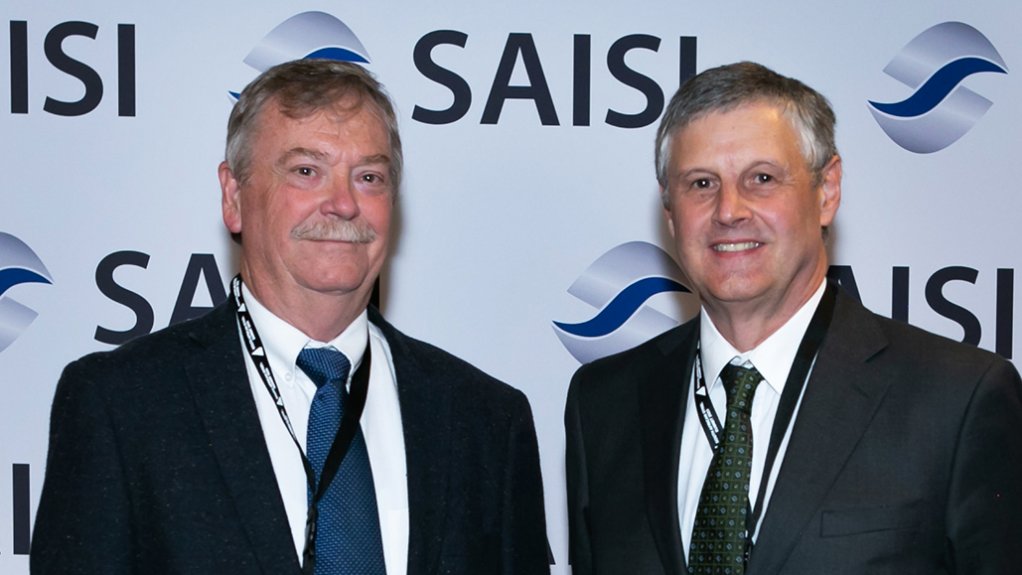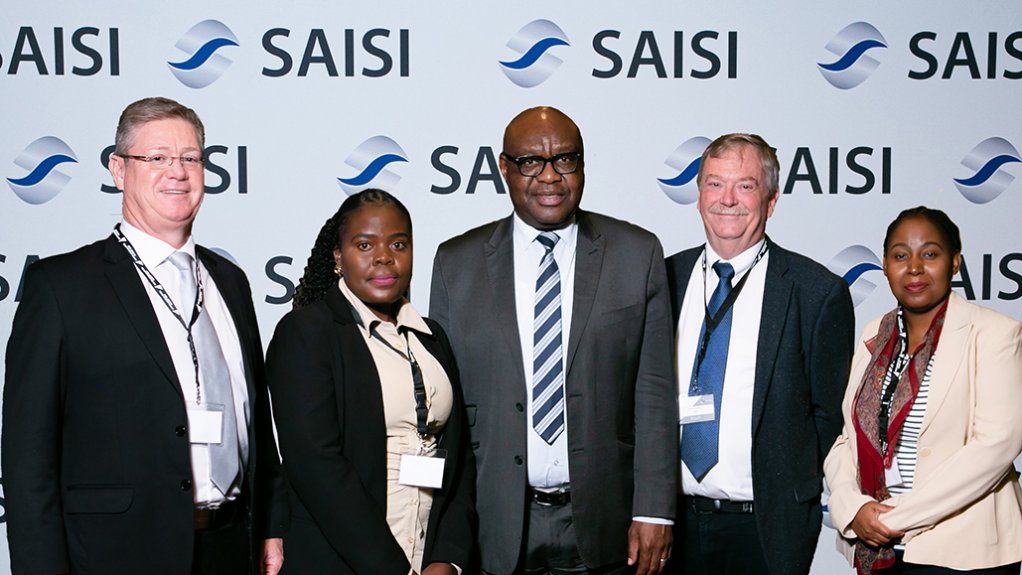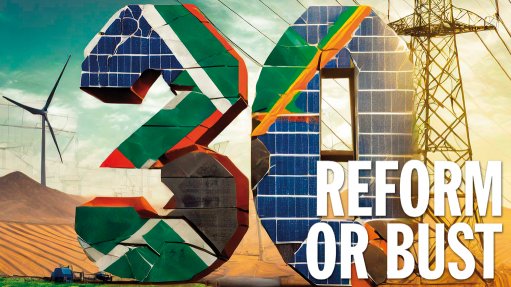Summit outlines industry plans



CHARLES DEDNAM AND DR EDWIN BASSON Saisi’s Southern African Steel Summit provided an opportunity to discuss challenges hindering sector growth
TO SUMMIT ALL UP… Saisi’s Southern African Steel Summit – held on August 30 – explored such topical themes, including the competitiveness of the steel sector, demand and supply, cost implications and innovation
International trade limitations, owing to slow market growth in Europe and the US, have, in turn, sparked the implementation of stringent trade conditions in the South African stainless steel industry, says South African Iron and Steel Institute (Saisi) secretary-general Charles Dednam.
Focus must be placed on import replacement of products that can be supplied competitively by the local market, he argues.
“We must optimise the application of our own products in projects on the subcontinent and especially those in South Africa. We need to diversify our product offerings to the market.”
Saisi’s Southern African Steel Summit – held on August 30 – explored such topical themes, including the competitiveness of the steel sector, demand and supply, cost implications and innovation.
The summit provided attendees with an understanding of the Southern African steel market and the near-term outlook for steel.
The event also enabled steel industry stakeholders to make informed decisions, build realistic budgets and forecasts, and assess risks and investments. It also provided an opportunity to discuss challenges hindering sector growth.
“We discussed the advancements being made with regard to various technologies in the industry that guide the development route in Africa and globally. “The summit focused on what the steel industry in South Africa is capable of, the capacities available for the country’s industrialisation drive and how to competitively supply steel for infrastructure being built,” explains Dednam.
The summit also highlighted challenges facing the local industry, such as crime and security, as well as logistical and energy constraints.
During his keynote address, Trade, Industry and Competition Deputy Minister Fikile Majola emphasised the crucial role of the steel industry in South Africa’s industrialisation, noting that Africa accounts for just 1.12% of global steel production despite having vast mineral reserves.
He highlighted that the impending Carbon Border Adjustment Mechanism by the European Union (EU) could further impact on South Africa’s exports negatively, with about R10-billion in exports at stake and representing 2.3% of South Africa’s exports to the EU.
Majola emphasised that addressing the carbon intensity of the country’s steel value chain was thus critical amid global initiatives to reduce the impact of climate change and embrace green steel and other mitigation technologies.
Africa’s rapid urbanisation, expanding cities and increasing energy needs demand significant steel use, thereby presenting opportunities for Africa’s growth and development, he said.
To this end, Majola noted that the yearly Brazil, Russia, India, China and South Africa, or Brics, Summit – also held in August – held the potential to benefit the steel industry through collaborations, knowledge-sharing and experience exchange among Brics countries.
The Infrastructure Working Group, with representation of all Brics nations, has pledged to cooperate with their respective governments to create opportunities through impactful infrastructure projects.
“The effective implementation of the social compact between government, business and labour can allow our domestic steel and stainless steel industries to regain their global standing, but we must avoid narrow interests that may lead to further de-industrialisation,” cautions Dednam.
Steel Masterplan
During his keynote address, Majola highlighted the Steel and Metal Fabrication Masterplan as a crucial initiative that underscores the significance of the steel industry for South Africa’s economy.
Local government had entered into a social compact with industry and labour to support the long-term growth of the steel sector, with the masterplan serving as an anchor for the implementation of the Re-imagined Industrial Strategy and the Economic Reconstruction and Recovery Plan, which is vital for integrated steel demand growth, he noted.
Key objectives of the Steel Masterplan include establishing a social compact to stabilise and grow the steel and steel products industry; increasing demand and mitigating issues such as illicit trade and inadequate localisation; retaining and increasing employment opportunities; transforming the industry; and ensuring that the industry and its workforce are prepared for the Fourth Industrial Revolution and the green economy.
The masterplan focuses on six priority areas: demand-side measures, supply-side measures, exports, transformation, human resources and skill development, and resource mobilisation.
Since its adoption in 2021, implementation successes of the masterplan have included 12 trade interventions, which have been executed to support downstream industry competitiveness and growth; the price preference system being extended for four years to ensure a competitive supply of scrap metals for value addition; and the Industrial Development Corporation of South Africa’s (IDC’s) having facilitated investments worth R5.2-billion in the value chain, supporting 2 220 jobs in 2022.
To boost exports, the IDC has partnered with the State-owned Export Credit Insurance Corporation to establish an Intra-Africa Trade Facility covering commercial and political risks.
An energy resilience fund was also launched in July 2023, with a R15-billion contribution from the IDC, aimed at addressing energy challenges in supply and demand. It will also provide funding to energy services companies for supplying financed energy solutions to small, medium-sized and microenterprises across various sectors.
Comments
Press Office
Announcements
What's On
Subscribe to improve your user experience...
Option 1 (equivalent of R125 a month):
Receive a weekly copy of Creamer Media's Engineering News & Mining Weekly magazine
(print copy for those in South Africa and e-magazine for those outside of South Africa)
Receive daily email newsletters
Access to full search results
Access archive of magazine back copies
Access to Projects in Progress
Access to ONE Research Report of your choice in PDF format
Option 2 (equivalent of R375 a month):
All benefits from Option 1
PLUS
Access to Creamer Media's Research Channel Africa for ALL Research Reports, in PDF format, on various industrial and mining sectors
including Electricity; Water; Energy Transition; Hydrogen; Roads, Rail and Ports; Coal; Gold; Platinum; Battery Metals; etc.
Already a subscriber?
Forgotten your password?
Receive weekly copy of Creamer Media's Engineering News & Mining Weekly magazine (print copy for those in South Africa and e-magazine for those outside of South Africa)
➕
Recieve daily email newsletters
➕
Access to full search results
➕
Access archive of magazine back copies
➕
Access to Projects in Progress
➕
Access to ONE Research Report of your choice in PDF format
RESEARCH CHANNEL AFRICA
R4500 (equivalent of R375 a month)
SUBSCRIBEAll benefits from Option 1
➕
Access to Creamer Media's Research Channel Africa for ALL Research Reports on various industrial and mining sectors, in PDF format, including on:
Electricity
➕
Water
➕
Energy Transition
➕
Hydrogen
➕
Roads, Rail and Ports
➕
Coal
➕
Gold
➕
Platinum
➕
Battery Metals
➕
etc.
Receive all benefits from Option 1 or Option 2 delivered to numerous people at your company
➕
Multiple User names and Passwords for simultaneous log-ins
➕
Intranet integration access to all in your organisation



















